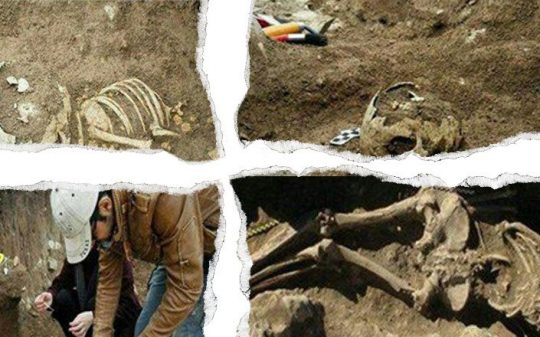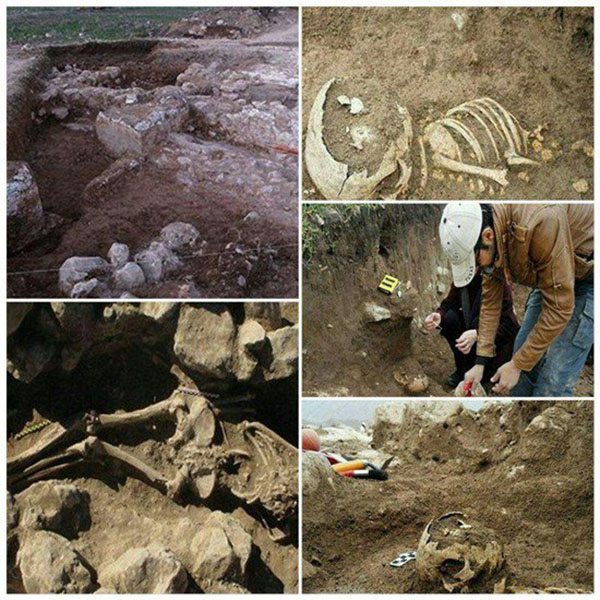Archaeologists digging in western Iran have recently unearthed the skeleton of an ancient giant surrounded by valuable artifacts.
Accounts of giants in ancient times are abundant in the Northern Hemisphere, and the area occupied by modern-day Iran is no exception. If anything, the Middle East is one of the regions that is extremely rich in such narratives. Given this historical context, the recent discovery of skeleton belonging to an ancient giant becomes even more relevant.
The giant we’re focusing on today lived some time around 500 A.D. and his remains were discovered at an archaeological dig in the Iranian province of Lorestan. The artifacts that surrounded his bones were carbon dated to the same period, meaning he was buried with his belongings.
Back then, the average male height was around 5 ft. 3 in. (160 centimeters) so a man standing over 6 feet 6 inches tall was a literal giant among his peers. He would have probably been dwarfed by the older-generation giants but, as most specialists agree, the genetic trait that caused gigantism was probably ‘watered down’ through successive breeding with regular-sized humans.
“In the north of the Chia Sabz area we found the grave of an elderly man. It consists of four clay walls, covered with a large stone slab.” – Chief archaeologist Ata Hasanpour.
The skeleton was found buried on its side in what appears to have been a graveyard. Other skeletons have been discovered in that particular burial ground but not in the vicinity of the giant. This is a clear indicator that the giant was a significant member of society and important enough to have been buried in an isolated grave filled with his earthly possessions.
“We found a lot of ceramic items of the Sasanian Empire close to the burial site, but we can only give them a more exact date after radiocarbon analysis,” the lead archaeologist said. “In the final days of the excavation, we managed to find a storeroom with two vessels for storing food. The contents of the vessels have been sent to a laboratory for further investigations.”
At the time the giant was alive, the area was under the rule of the Sasanian Empire.In the Middle Persian language, the kingdom was called Ēranshāhr and it was the last great Iranian empire established prior to the Muslim conquest and the nation-wide adoption of Islam. Scholars consider the Sasanid imperial dynasty (224 – 651 A.D.) as one of the leading world powers at that time and their rule spanned one of Iran’s most important and influential historical periods. The only contemporary rival that matched their resources and reputation was the Byzantine Empire.
It is important to note that this discovery was made in the same area where whistleblower Corey Goode claimed to have seen an underground cavern housing the stasis chambers where ancient giants lay in suspended animation, awaiting their awakening. According to Goode, the giants had been placed in a deathlike state inside crystal pods since times immemorial.
The stasis chambers were a testament to the ancient giants’ technological prowess; they mastered crystal technology that affected the local flow of time. As a result, the time bubble created inside the pods meant their occupants could survive for thousands of years and to them, it would feel like minutes.
Such technology is but a distant dream for humanity, but the whistleblower claims it has been around on our planet for millennia.
“This Ancient Builder technology is so far beyond even what most of these fourth-, fifth-density ETs use that some of these beings want to get their hands on it. It’s multi-dimensional technology.” – Whistleblower Corey Goode
Naturally, Goode offers little palpable evidence in support of his claims but nevertheless, he presents an intriguing scenario we’re all too familiar with. It’s almost certain that our planet has a parallel history of which we know almost nothing. And in the two centuries that have passed since we went through the Industrial Revolution, we’ve managed to upgrade our tech from horse-drawn carriage to space probes that managed to leave the confines of our Solar System. Just imagine what 30,000 years of uninterrupted technological evolution could achieve.
Within this framework, it makes sense for an ancient civilization to rise and mature to a level far superior to our own and eventually succumb to one of the many perils it faced. Its few survivors would undoubtedly try to use technology to save themselves and is there a better place to remain undisturbed than the underground?
The following video shows the discovery of one such sarcophagus containing an alleged giant in suspended animation. Strange but it could very well be a forgery. What do you think?










